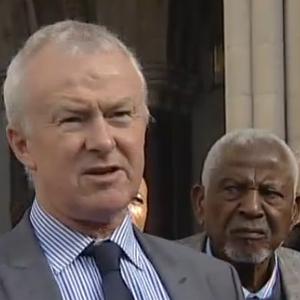Taking former colonial masters to court
Mau Mau compensation case (BBC video)
By Laura Lynch
Distant memories of beatings and torture spilled into a courtroom in London on Thursday. Four elderly Kenyans are suing the British government, claiming they were abused at the hands of British authorities during an uprising in Kenya in the 1950s. The four are among a group of thousands who were detained — a group that also included Barack Obama’s grandfather.
It was a time of rebellion against colonial rule. The British and their supporters were the targets. The Mau Mau killed thousands, prompting Britain to declare a state of emergency in 1952. More than 100,000 Kenyans were hauled into detention camps, suspected of being rebels.
Wambugu Wa Nyingi, who was held in one of those camps, said one day he and others ordered them to start digging.
“When we were digging, they started beating us,” Nyingi said. “They were beating us with huge sticks and I lost consciousness. When I came to, I saw that all my colleagues, 11 of them, were dead.”
Nyingi was held for nine years without charge. He claims that during that time he witnessed British officers take part in beatings and torture.
“One morning there came a battalion of white officers together with black people, and they began to take people out behind where they had been locked up, and they started clobbering them to death,” Nyingi said. “A number of people were castrated; others had their testicles smashed with a club. Fourteen people died on the spot,” he said.
Nyingi is one of four Kenyans, all in their 70s and 80s, who have traveled to London to press their case. Their lawyer Martyn Day said today they deserve justice.
Trying to reach resolution
“This is a case not about re-opening the old wounds,” Day said. It’s “about individuals who are alive today and who have suffered the most terrible, terrible things at the hand of the British. Now is a time for us to try and reach some sort of resolution to that and we hope the court today, over the next few days, gives us a positive answer.”
In court Thursday, a lawyer for the British government admitted that torture and killings did take place. But he argued that since there was no explicit law authorizing the violence, the government isn’t responsible.
Newly released government documents may tell a different story, though, according to David Anderson, a professor of African politics at Oxford University, who has examined many of the files.
“Senior members of the Colonial Office in London did know what was happening,” Anderson said. “Senior legal officials in London did to some extent sanction the use of coercive force, and also at cabinet level, the Secretary of State for the Colonies certainly knew of the excesses that were taking place.”
Compensation
Most of those who died during the uprising were black Kenyans, killed by Mau Mau rebels when they refused to join the fight. Tim Symonds, who worked for the Kenyan Police Reserve in the 1950s and saw the violence up close, points out that no one from the Mau Mau has apologized to those victims or offered compensation.
“Why isn’t someone saying to these Mau Mau, you want an apology from the British government? Okay, fine,” Symonds said. “But why don’t you for a change apologize to the ten thousand of your own tribe you slaughtered?”
Symonds agrees that those who were abused in the camps should be compensated, but he still thinks it was right to crush the insurgents.
“They really got what they deserved,” Symonds said. “I’m really quite tough on this. If I had a chance again in the same situation, them killing people, would I go out and kill them again as I did? Yes sir, I would.”
Retired Archbishop Desmond Tutu is urging the British government to settle with the victims.
“This is not a legal issue. It is a moral issue,” Tutu said. “Even if they were to win the legal battle, they would leave an enormous moral blot on their record.”
It’s a sentiment echoed by Oxford professor David Anderson.
“At a time like this when members of our Foreign Office and ministers talk about potential war crimes prosecutions in Libya, they should also look to their own back yard and to things that went on under the British flag,” Anderson said.
It may not be that simple for the British government.
If it loses, the case could pave the way for thousands of others who claim they also suffered under colonial rule in Kenya and other nations.
Our coverage reaches millions each week, but only a small fraction of listeners contribute to sustain our program. We still need 224 more people to donate $100 or $10/monthly to unlock our $67,000 match. Will you help us get there today?
